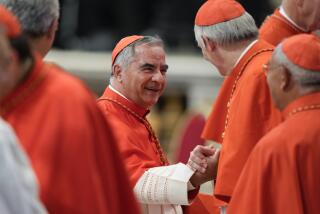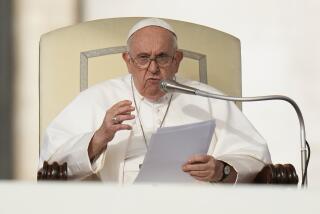4 Polish Officers Get Prison Terms : Sentences Range From 14-25 Years for Secret Police in Priest’s Killing
- Share via
TORUN, Poland — A Polish court Thursday convicted four secret police officers of murdering one of the nation’s most popular Roman Catholic priests but rejected death penalties and sentenced all four to long prison terms.
Capt. Grzegorz Piotrowski, 33, described as the chief organizer of the killing, and Col. Adam Pietruszka, 47, the oldest of the accused men, were both sentenced to 25-year prison terms, the longest possible under Polish law. Both men were also deprived of their basic civil rights for an additional 10 years.
Two junior officers, Lt. Leszek Pekala, 32, and Lt. Waldemar Chmielewski, 29, were given prison terms of 15 and 14 years, respectively.
All four were convicted in connection with the kidnap and killing last October of Father Jerzy Popieluszko, widely respected in this staunchly Catholic nation for his outspoken condemnation of the Communist government’s repressive measures and his support for the outlawed Solidarity independent trade union.
‘Intention to Kill’
“They wanted to kill, and they implemented their plan,” Chief Judge Artur Kujawa said in a 75-minute statement explaining the verdict. “The intention to kill existed before the abduction.”
Kujawa also noted that during the few hours between the time the 37-year-old priest was pulled from his automobile near here and when his body was thrown into a reservoir, he was treated with “exceptional cruelty and ruthlessness.” Popieluszko was severely beaten before he was dumped in the trunk of a secret police vehicle and taken to the reservoir.
Kujawa said the court rejected the death penalty, which the prosecution requested for Piotrowski, because “according to Poland’s socialist penal law, punishment imposed by the court is not and should not be revenge. Punishment,” he added, “is supposed to educate and deter.”
The defendants are expected to appeal the sentences to the Polish Supreme Court, a process that could take months.
Popieluszko’s murder stunned and outraged the Polish public and presented the government of Premier Wojciech Jaruzelski with a major crisis.
In an apparent attempt to dampen public anger and to discipline the country’s increasingly independent state security apparatus, Jaruzelski took the unprecedented step of ordering a public trial for the secret police officers.
Rare Look Inside Structure
The subsequent proceedings, conducted in the stark district courthouse of this industrial town, were given saturation press coverage, presenting the Polish public and foreign observers here with a rare look inside a Communist country’s security structure.
The trial, one of the most sensational ever held in a Soviet Bloc country, has strained the regime’s important relationship with the Catholic church and humiliated the secret service, but it also has helped defuse public outrage.
News of the verdict was flashed by PAP, the domestic news agency, and a prolonged television news special on the verdict was transmitted Thursday evening.
Piotrowski, by far the most articulate and composed of the defendants during the 26-day trial, stared at the ceiling as the verdict was read, then slumped forward, head in hands, and began to sob.
Pietruszka, a 24-year veteran of the secret police and the only one of the four accused to plead not guilty, stood expressionless as tears welled in his eyes.
Under the civil rights provisions of their sentences, both will lose their ranks and honors and will be barred from voting or holding office.
The hundred-seat courtroom was packed more than an hour before the verdict was read. Many of those present were secret police officers.
Neither Popieluszko’s two brothers nor church observers who had attended the trial regularly were in court Thursday. Sources close to the family explained that the brothers did not want their faces exploited by television.
The church has maintained it was interested only in full public disclosure of the facts surrounding the crime. The sentence is a state prerogative, the church said.
Tass, the official Soviet news agency, reported the end of the trial Thursday but did not identify the convicted men as secret policemen and emphasized what it called the anti-Communist posture of the Polish church. It charged that churches in Poland “are frequently put at the disposal of oppositional and subversive elements for conducting anti-state, anti-socialist propaganda.”
Lawyers representing the slain priest’s family expressed satisfaction at the verdict. (Polish law permits persons with a direct interest in criminal cases to appoint private “prosecutors” to supplement the efforts of the state prosecutors.)
‘Sense of Justice’
“The sentence is well-balanced and corresponds to my sense of justice,” said Andrzej Grabinski, the lawyer retained by Popieluszko’s mother.
A spokesman for the Polish Episcopate in Warsaw called the sentences “very high.” “The church is not going to criticize it,” Father Henryk Brunka said. He added that the church plans to issue a statement on the entire trial after a plenary session of bishops next week.
However, clusters of Poles who gathered in the narrow lanes adjacent to the courthouse for word of the verdict bitterly condemned the sentence as too light.
“What kind of verdict is that!” one bystander shouted indignantly.
“They should all be put to death,” another said. “They’ll be some kind of amnesty and then they will all go free.”
Similar reactions were expressed elsewhere.
Symbol of Resistance
The comments reflected just how great a symbol of resistance Popieluszko has become since his death. In churches throughout Poland, small memorials, invariably filled with candles and the priest’s photo, have appeared.
In one church near the Torun courthouse, a handful of elderly women gathered Thursday around one such memorial, a cross of flowers, surrounded by candles, and a banner bearing the inscription, “He Gave His Life So We Could Live in Dignity.”
In delivering its verdict, the court avoided any of the often-intense criticism of church political activity that had characterized the second half of the trial.
On two occasions, one of the state prosecutors, apparently acting on government orders, tried to equate Popieluszko’s anti-government rhetoric with the actions of his murderers, saying, “One extremism leads to another extremism.”
More to Read
Sign up for Essential California
The most important California stories and recommendations in your inbox every morning.
You may occasionally receive promotional content from the Los Angeles Times.













